Evaluating Leadership and Management Strategies in Tesco's Context
VerifiedAdded on 2023/01/06
|23
|6528
|1
Report
AI Summary
This report provides an in-depth analysis of leadership and management practices within Tesco, a multinational retail organization. It begins by defining and comparing the roles and characteristics of leaders and managers, differentiating their functions and examining how they apply in various situational contexts, such as change management and reward systems. The report then applies different leadership theories and models, including situational, systems, and contingency approaches, evaluating their strengths and weaknesses in the context of Tesco's operations. It further explores the key approaches to operations management, highlighting the roles of leaders and managers in achieving business objectives and improving operational efficiencies. The report also examines factors impacting operational management and decision-making, considering both internal and external environmental influences. Through this comprehensive analysis, the report offers insights into effective leadership and management strategies within a large retail environment, using Tesco as a case study.
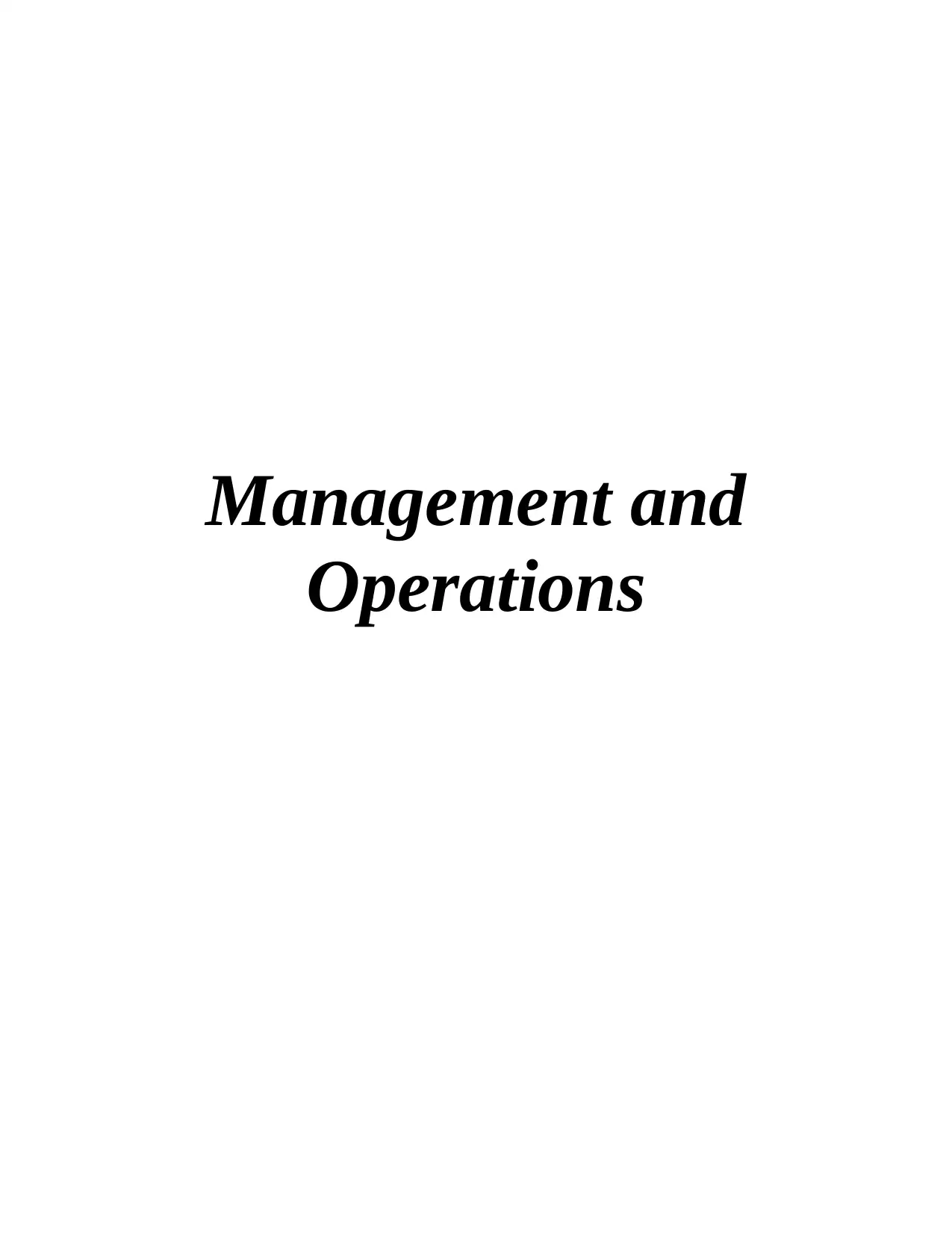
Management and
Operations
Operations
Paraphrase This Document
Need a fresh take? Get an instant paraphrase of this document with our AI Paraphraser
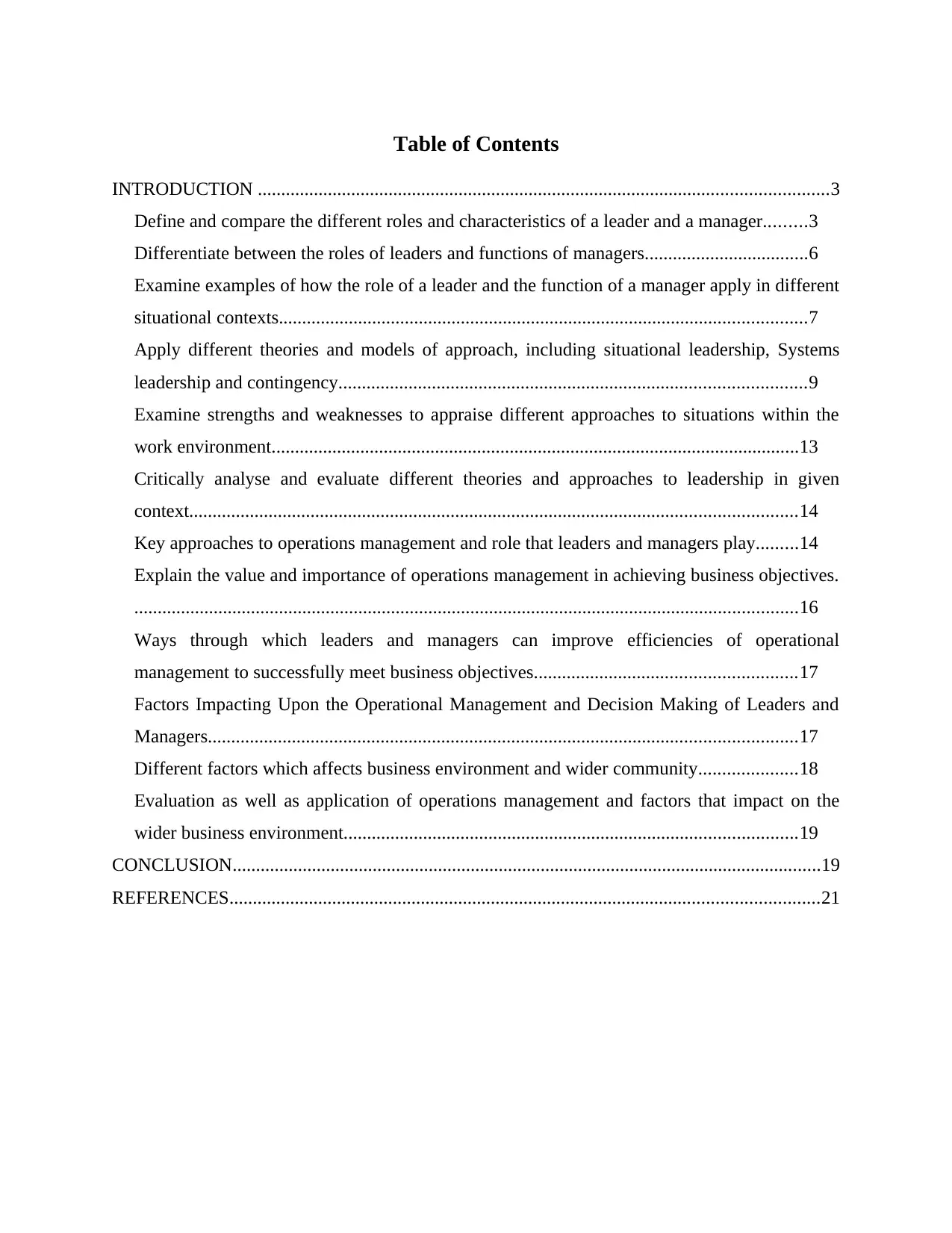
Table of Contents
INTRODUCTION ..........................................................................................................................3
Define and compare the different roles and characteristics of a leader and a manager.........3
Differentiate between the roles of leaders and functions of managers...................................6
Examine examples of how the role of a leader and the function of a manager apply in different
situational contexts.................................................................................................................7
Apply different theories and models of approach, including situational leadership, Systems
leadership and contingency....................................................................................................9
Examine strengths and weaknesses to appraise different approaches to situations within the
work environment.................................................................................................................13
Critically analyse and evaluate different theories and approaches to leadership in given
context..................................................................................................................................14
Key approaches to operations management and role that leaders and managers play.........14
Explain the value and importance of operations management in achieving business objectives.
..............................................................................................................................................16
Ways through which leaders and managers can improve efficiencies of operational
management to successfully meet business objectives........................................................17
Factors Impacting Upon the Operational Management and Decision Making of Leaders and
Managers..............................................................................................................................17
Different factors which affects business environment and wider community.....................18
Evaluation as well as application of operations management and factors that impact on the
wider business environment.................................................................................................19
CONCLUSION..............................................................................................................................19
REFERENCES..............................................................................................................................21
INTRODUCTION ..........................................................................................................................3
Define and compare the different roles and characteristics of a leader and a manager.........3
Differentiate between the roles of leaders and functions of managers...................................6
Examine examples of how the role of a leader and the function of a manager apply in different
situational contexts.................................................................................................................7
Apply different theories and models of approach, including situational leadership, Systems
leadership and contingency....................................................................................................9
Examine strengths and weaknesses to appraise different approaches to situations within the
work environment.................................................................................................................13
Critically analyse and evaluate different theories and approaches to leadership in given
context..................................................................................................................................14
Key approaches to operations management and role that leaders and managers play.........14
Explain the value and importance of operations management in achieving business objectives.
..............................................................................................................................................16
Ways through which leaders and managers can improve efficiencies of operational
management to successfully meet business objectives........................................................17
Factors Impacting Upon the Operational Management and Decision Making of Leaders and
Managers..............................................................................................................................17
Different factors which affects business environment and wider community.....................18
Evaluation as well as application of operations management and factors that impact on the
wider business environment.................................................................................................19
CONCLUSION..............................................................................................................................19
REFERENCES..............................................................................................................................21
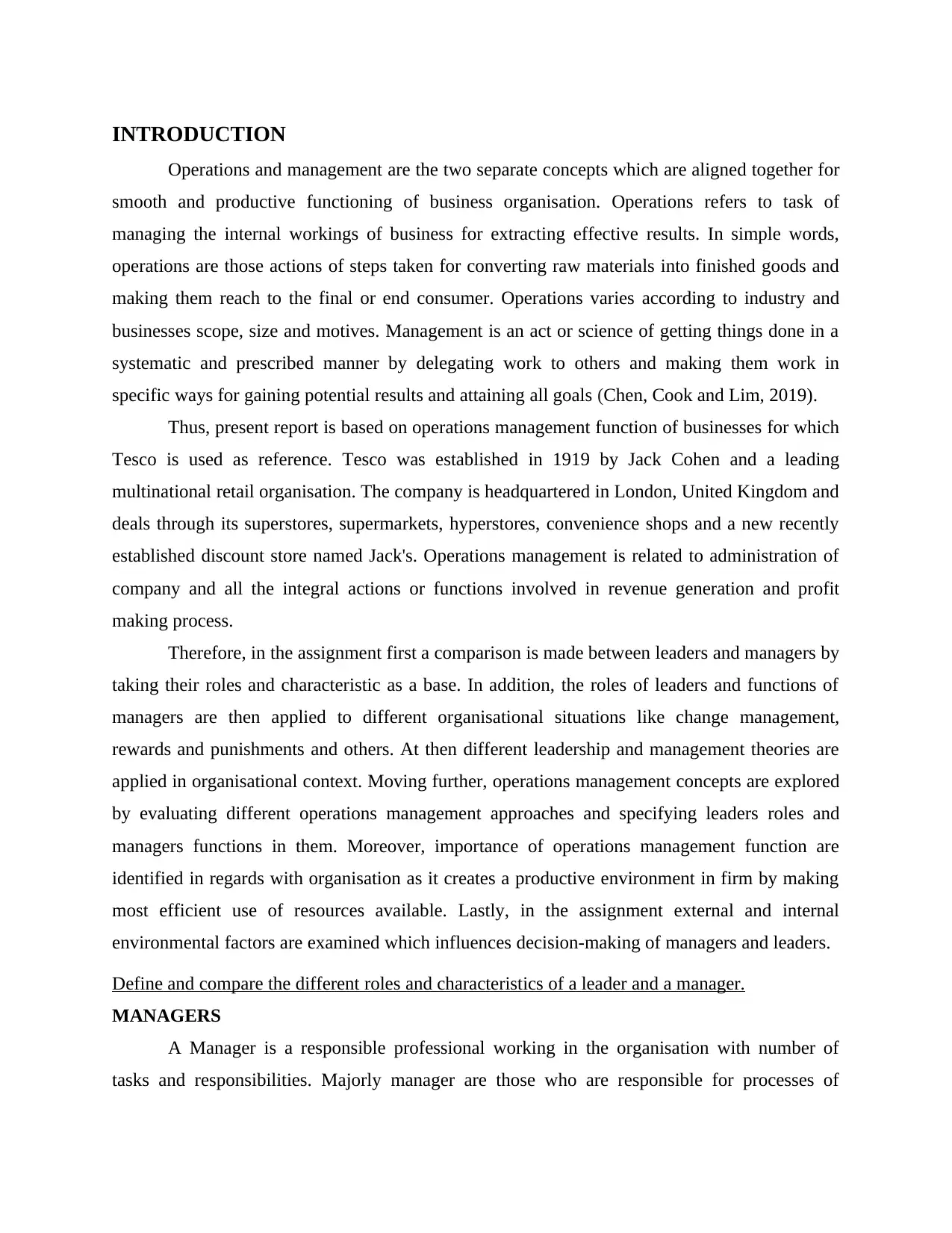
INTRODUCTION
Operations and management are the two separate concepts which are aligned together for
smooth and productive functioning of business organisation. Operations refers to task of
managing the internal workings of business for extracting effective results. In simple words,
operations are those actions of steps taken for converting raw materials into finished goods and
making them reach to the final or end consumer. Operations varies according to industry and
businesses scope, size and motives. Management is an act or science of getting things done in a
systematic and prescribed manner by delegating work to others and making them work in
specific ways for gaining potential results and attaining all goals (Chen, Cook and Lim, 2019).
Thus, present report is based on operations management function of businesses for which
Tesco is used as reference. Tesco was established in 1919 by Jack Cohen and a leading
multinational retail organisation. The company is headquartered in London, United Kingdom and
deals through its superstores, supermarkets, hyperstores, convenience shops and a new recently
established discount store named Jack's. Operations management is related to administration of
company and all the integral actions or functions involved in revenue generation and profit
making process.
Therefore, in the assignment first a comparison is made between leaders and managers by
taking their roles and characteristic as a base. In addition, the roles of leaders and functions of
managers are then applied to different organisational situations like change management,
rewards and punishments and others. At then different leadership and management theories are
applied in organisational context. Moving further, operations management concepts are explored
by evaluating different operations management approaches and specifying leaders roles and
managers functions in them. Moreover, importance of operations management function are
identified in regards with organisation as it creates a productive environment in firm by making
most efficient use of resources available. Lastly, in the assignment external and internal
environmental factors are examined which influences decision-making of managers and leaders.
Define and compare the different roles and characteristics of a leader and a manager.
MANAGERS
A Manager is a responsible professional working in the organisation with number of
tasks and responsibilities. Majorly manager are those who are responsible for processes of
Operations and management are the two separate concepts which are aligned together for
smooth and productive functioning of business organisation. Operations refers to task of
managing the internal workings of business for extracting effective results. In simple words,
operations are those actions of steps taken for converting raw materials into finished goods and
making them reach to the final or end consumer. Operations varies according to industry and
businesses scope, size and motives. Management is an act or science of getting things done in a
systematic and prescribed manner by delegating work to others and making them work in
specific ways for gaining potential results and attaining all goals (Chen, Cook and Lim, 2019).
Thus, present report is based on operations management function of businesses for which
Tesco is used as reference. Tesco was established in 1919 by Jack Cohen and a leading
multinational retail organisation. The company is headquartered in London, United Kingdom and
deals through its superstores, supermarkets, hyperstores, convenience shops and a new recently
established discount store named Jack's. Operations management is related to administration of
company and all the integral actions or functions involved in revenue generation and profit
making process.
Therefore, in the assignment first a comparison is made between leaders and managers by
taking their roles and characteristic as a base. In addition, the roles of leaders and functions of
managers are then applied to different organisational situations like change management,
rewards and punishments and others. At then different leadership and management theories are
applied in organisational context. Moving further, operations management concepts are explored
by evaluating different operations management approaches and specifying leaders roles and
managers functions in them. Moreover, importance of operations management function are
identified in regards with organisation as it creates a productive environment in firm by making
most efficient use of resources available. Lastly, in the assignment external and internal
environmental factors are examined which influences decision-making of managers and leaders.
Define and compare the different roles and characteristics of a leader and a manager.
MANAGERS
A Manager is a responsible professional working in the organisation with number of
tasks and responsibilities. Majorly manager are those who are responsible for processes of
⊘ This is a preview!⊘
Do you want full access?
Subscribe today to unlock all pages.

Trusted by 1+ million students worldwide
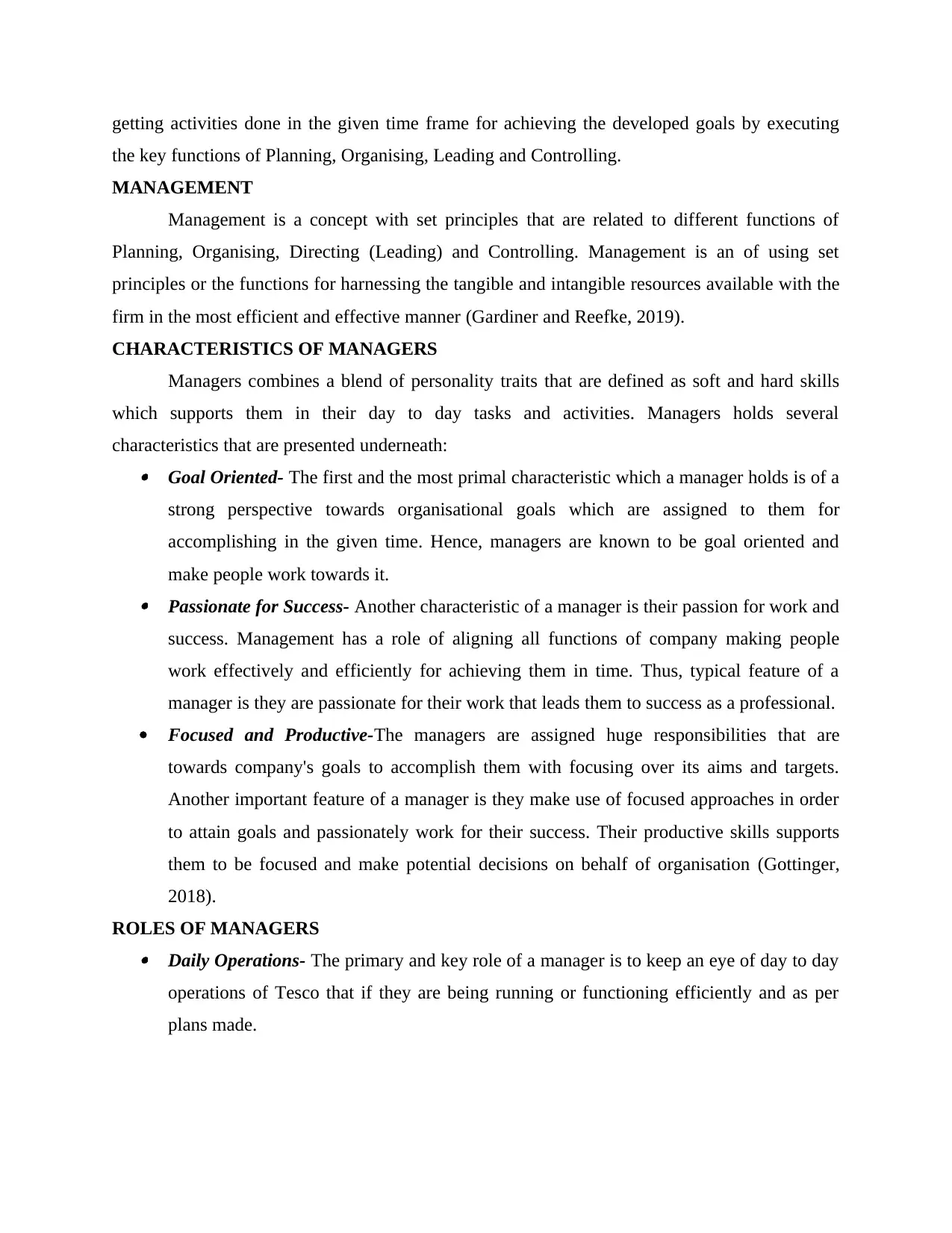
getting activities done in the given time frame for achieving the developed goals by executing
the key functions of Planning, Organising, Leading and Controlling.
MANAGEMENT
Management is a concept with set principles that are related to different functions of
Planning, Organising, Directing (Leading) and Controlling. Management is an of using set
principles or the functions for harnessing the tangible and intangible resources available with the
firm in the most efficient and effective manner (Gardiner and Reefke, 2019).
CHARACTERISTICS OF MANAGERS
Managers combines a blend of personality traits that are defined as soft and hard skills
which supports them in their day to day tasks and activities. Managers holds several
characteristics that are presented underneath: Goal Oriented- The first and the most primal characteristic which a manager holds is of a
strong perspective towards organisational goals which are assigned to them for
accomplishing in the given time. Hence, managers are known to be goal oriented and
make people work towards it. Passionate for Success- Another characteristic of a manager is their passion for work and
success. Management has a role of aligning all functions of company making people
work effectively and efficiently for achieving them in time. Thus, typical feature of a
manager is they are passionate for their work that leads them to success as a professional.
Focused and Productive-The managers are assigned huge responsibilities that are
towards company's goals to accomplish them with focusing over its aims and targets.
Another important feature of a manager is they make use of focused approaches in order
to attain goals and passionately work for their success. Their productive skills supports
them to be focused and make potential decisions on behalf of organisation (Gottinger,
2018).
ROLES OF MANAGERS Daily Operations- The primary and key role of a manager is to keep an eye of day to day
operations of Tesco that if they are being running or functioning efficiently and as per
plans made.
the key functions of Planning, Organising, Leading and Controlling.
MANAGEMENT
Management is a concept with set principles that are related to different functions of
Planning, Organising, Directing (Leading) and Controlling. Management is an of using set
principles or the functions for harnessing the tangible and intangible resources available with the
firm in the most efficient and effective manner (Gardiner and Reefke, 2019).
CHARACTERISTICS OF MANAGERS
Managers combines a blend of personality traits that are defined as soft and hard skills
which supports them in their day to day tasks and activities. Managers holds several
characteristics that are presented underneath: Goal Oriented- The first and the most primal characteristic which a manager holds is of a
strong perspective towards organisational goals which are assigned to them for
accomplishing in the given time. Hence, managers are known to be goal oriented and
make people work towards it. Passionate for Success- Another characteristic of a manager is their passion for work and
success. Management has a role of aligning all functions of company making people
work effectively and efficiently for achieving them in time. Thus, typical feature of a
manager is they are passionate for their work that leads them to success as a professional.
Focused and Productive-The managers are assigned huge responsibilities that are
towards company's goals to accomplish them with focusing over its aims and targets.
Another important feature of a manager is they make use of focused approaches in order
to attain goals and passionately work for their success. Their productive skills supports
them to be focused and make potential decisions on behalf of organisation (Gottinger,
2018).
ROLES OF MANAGERS Daily Operations- The primary and key role of a manager is to keep an eye of day to day
operations of Tesco that if they are being running or functioning efficiently and as per
plans made.
Paraphrase This Document
Need a fresh take? Get an instant paraphrase of this document with our AI Paraphraser
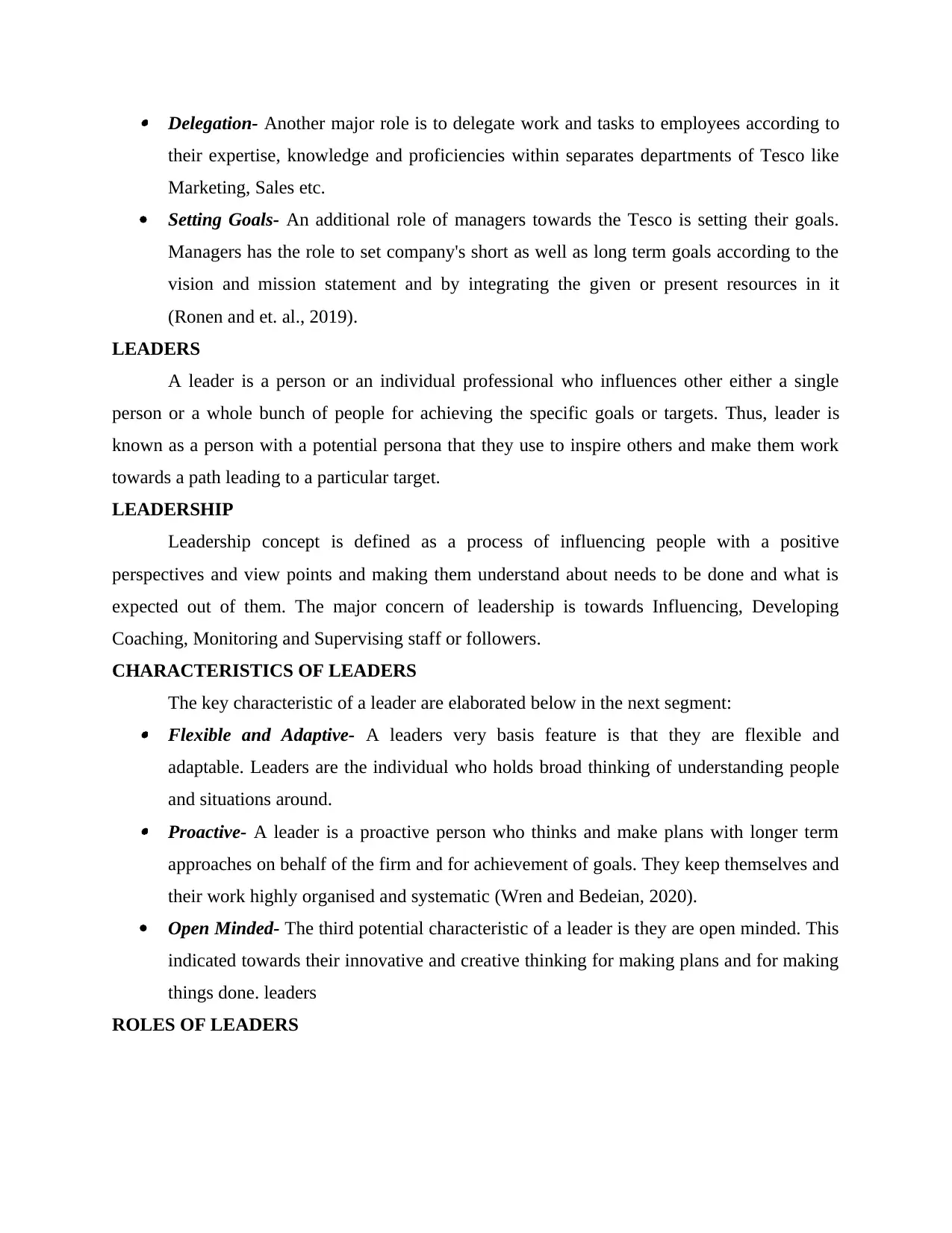
Delegation- Another major role is to delegate work and tasks to employees according to
their expertise, knowledge and proficiencies within separates departments of Tesco like
Marketing, Sales etc.
Setting Goals- An additional role of managers towards the Tesco is setting their goals.
Managers has the role to set company's short as well as long term goals according to the
vision and mission statement and by integrating the given or present resources in it
(Ronen and et. al., 2019).
LEADERS
A leader is a person or an individual professional who influences other either a single
person or a whole bunch of people for achieving the specific goals or targets. Thus, leader is
known as a person with a potential persona that they use to inspire others and make them work
towards a path leading to a particular target.
LEADERSHIP
Leadership concept is defined as a process of influencing people with a positive
perspectives and view points and making them understand about needs to be done and what is
expected out of them. The major concern of leadership is towards Influencing, Developing
Coaching, Monitoring and Supervising staff or followers.
CHARACTERISTICS OF LEADERS
The key characteristic of a leader are elaborated below in the next segment: Flexible and Adaptive- A leaders very basis feature is that they are flexible and
adaptable. Leaders are the individual who holds broad thinking of understanding people
and situations around. Proactive- A leader is a proactive person who thinks and make plans with longer term
approaches on behalf of the firm and for achievement of goals. They keep themselves and
their work highly organised and systematic (Wren and Bedeian, 2020).
Open Minded- The third potential characteristic of a leader is they are open minded. This
indicated towards their innovative and creative thinking for making plans and for making
things done. leaders
ROLES OF LEADERS
their expertise, knowledge and proficiencies within separates departments of Tesco like
Marketing, Sales etc.
Setting Goals- An additional role of managers towards the Tesco is setting their goals.
Managers has the role to set company's short as well as long term goals according to the
vision and mission statement and by integrating the given or present resources in it
(Ronen and et. al., 2019).
LEADERS
A leader is a person or an individual professional who influences other either a single
person or a whole bunch of people for achieving the specific goals or targets. Thus, leader is
known as a person with a potential persona that they use to inspire others and make them work
towards a path leading to a particular target.
LEADERSHIP
Leadership concept is defined as a process of influencing people with a positive
perspectives and view points and making them understand about needs to be done and what is
expected out of them. The major concern of leadership is towards Influencing, Developing
Coaching, Monitoring and Supervising staff or followers.
CHARACTERISTICS OF LEADERS
The key characteristic of a leader are elaborated below in the next segment: Flexible and Adaptive- A leaders very basis feature is that they are flexible and
adaptable. Leaders are the individual who holds broad thinking of understanding people
and situations around. Proactive- A leader is a proactive person who thinks and make plans with longer term
approaches on behalf of the firm and for achievement of goals. They keep themselves and
their work highly organised and systematic (Wren and Bedeian, 2020).
Open Minded- The third potential characteristic of a leader is they are open minded. This
indicated towards their innovative and creative thinking for making plans and for making
things done. leaders
ROLES OF LEADERS
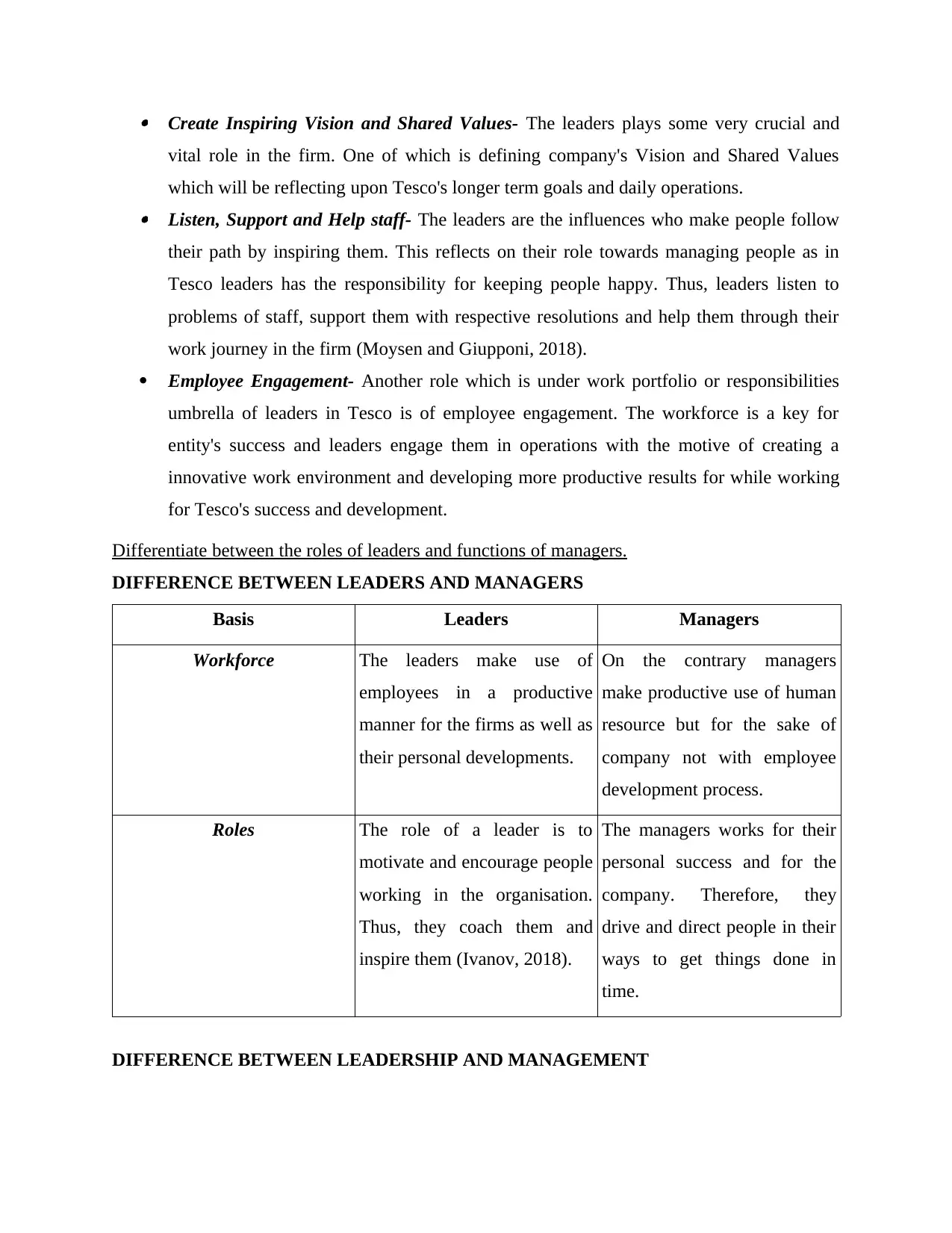
Create Inspiring Vision and Shared Values- The leaders plays some very crucial and
vital role in the firm. One of which is defining company's Vision and Shared Values
which will be reflecting upon Tesco's longer term goals and daily operations. Listen, Support and Help staff- The leaders are the influences who make people follow
their path by inspiring them. This reflects on their role towards managing people as in
Tesco leaders has the responsibility for keeping people happy. Thus, leaders listen to
problems of staff, support them with respective resolutions and help them through their
work journey in the firm (Moysen and Giupponi, 2018).
Employee Engagement- Another role which is under work portfolio or responsibilities
umbrella of leaders in Tesco is of employee engagement. The workforce is a key for
entity's success and leaders engage them in operations with the motive of creating a
innovative work environment and developing more productive results for while working
for Tesco's success and development.
Differentiate between the roles of leaders and functions of managers.
DIFFERENCE BETWEEN LEADERS AND MANAGERS
Basis Leaders Managers
Workforce The leaders make use of
employees in a productive
manner for the firms as well as
their personal developments.
On the contrary managers
make productive use of human
resource but for the sake of
company not with employee
development process.
Roles The role of a leader is to
motivate and encourage people
working in the organisation.
Thus, they coach them and
inspire them (Ivanov, 2018).
The managers works for their
personal success and for the
company. Therefore, they
drive and direct people in their
ways to get things done in
time.
DIFFERENCE BETWEEN LEADERSHIP AND MANAGEMENT
vital role in the firm. One of which is defining company's Vision and Shared Values
which will be reflecting upon Tesco's longer term goals and daily operations. Listen, Support and Help staff- The leaders are the influences who make people follow
their path by inspiring them. This reflects on their role towards managing people as in
Tesco leaders has the responsibility for keeping people happy. Thus, leaders listen to
problems of staff, support them with respective resolutions and help them through their
work journey in the firm (Moysen and Giupponi, 2018).
Employee Engagement- Another role which is under work portfolio or responsibilities
umbrella of leaders in Tesco is of employee engagement. The workforce is a key for
entity's success and leaders engage them in operations with the motive of creating a
innovative work environment and developing more productive results for while working
for Tesco's success and development.
Differentiate between the roles of leaders and functions of managers.
DIFFERENCE BETWEEN LEADERS AND MANAGERS
Basis Leaders Managers
Workforce The leaders make use of
employees in a productive
manner for the firms as well as
their personal developments.
On the contrary managers
make productive use of human
resource but for the sake of
company not with employee
development process.
Roles The role of a leader is to
motivate and encourage people
working in the organisation.
Thus, they coach them and
inspire them (Ivanov, 2018).
The managers works for their
personal success and for the
company. Therefore, they
drive and direct people in their
ways to get things done in
time.
DIFFERENCE BETWEEN LEADERSHIP AND MANAGEMENT
⊘ This is a preview!⊘
Do you want full access?
Subscribe today to unlock all pages.

Trusted by 1+ million students worldwide
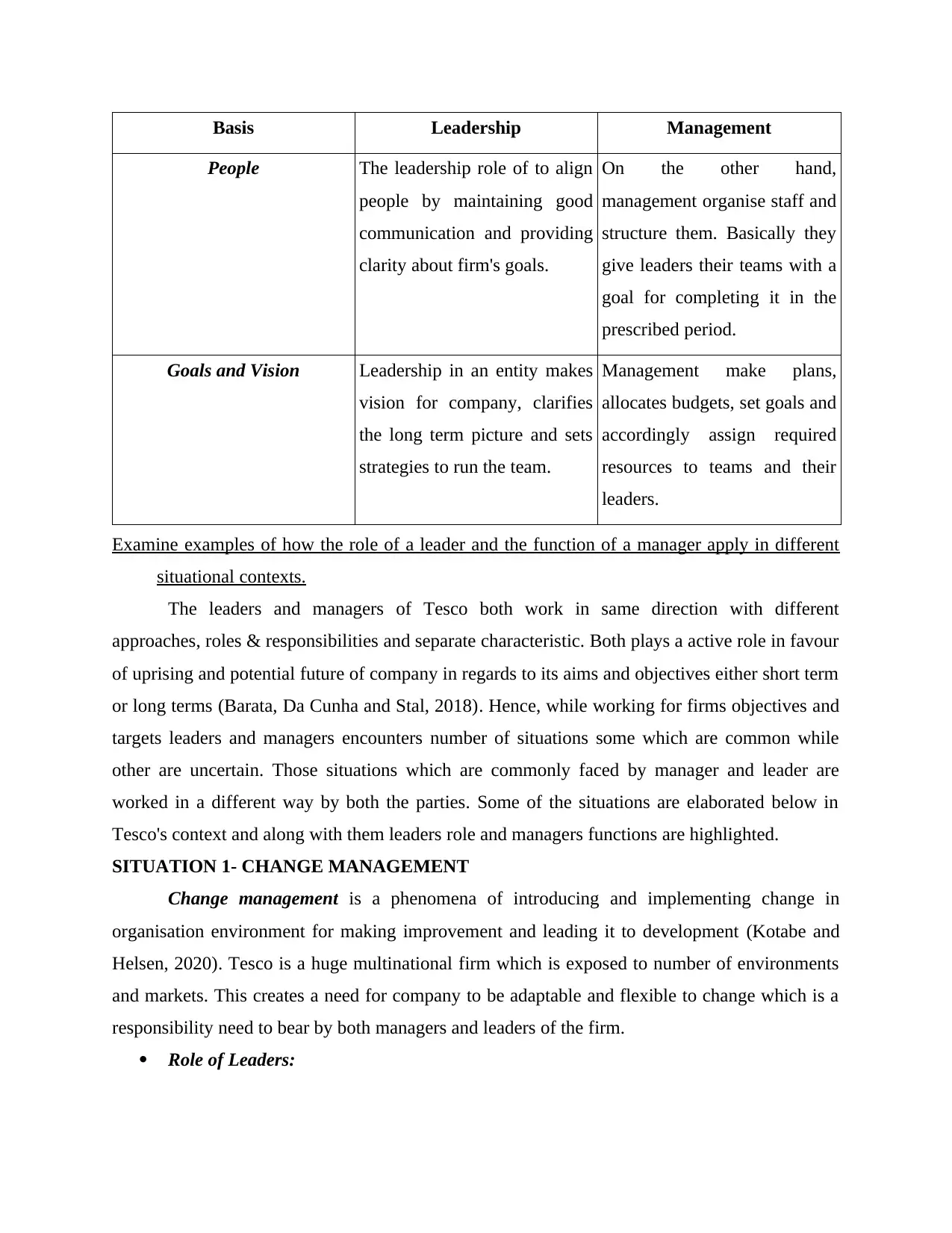
Basis Leadership Management
People The leadership role of to align
people by maintaining good
communication and providing
clarity about firm's goals.
On the other hand,
management organise staff and
structure them. Basically they
give leaders their teams with a
goal for completing it in the
prescribed period.
Goals and Vision Leadership in an entity makes
vision for company, clarifies
the long term picture and sets
strategies to run the team.
Management make plans,
allocates budgets, set goals and
accordingly assign required
resources to teams and their
leaders.
Examine examples of how the role of a leader and the function of a manager apply in different
situational contexts.
The leaders and managers of Tesco both work in same direction with different
approaches, roles & responsibilities and separate characteristic. Both plays a active role in favour
of uprising and potential future of company in regards to its aims and objectives either short term
or long terms (Barata, Da Cunha and Stal, 2018). Hence, while working for firms objectives and
targets leaders and managers encounters number of situations some which are common while
other are uncertain. Those situations which are commonly faced by manager and leader are
worked in a different way by both the parties. Some of the situations are elaborated below in
Tesco's context and along with them leaders role and managers functions are highlighted.
SITUATION 1- CHANGE MANAGEMENT
Change management is a phenomena of introducing and implementing change in
organisation environment for making improvement and leading it to development (Kotabe and
Helsen, 2020). Tesco is a huge multinational firm which is exposed to number of environments
and markets. This creates a need for company to be adaptable and flexible to change which is a
responsibility need to bear by both managers and leaders of the firm.
Role of Leaders:
People The leadership role of to align
people by maintaining good
communication and providing
clarity about firm's goals.
On the other hand,
management organise staff and
structure them. Basically they
give leaders their teams with a
goal for completing it in the
prescribed period.
Goals and Vision Leadership in an entity makes
vision for company, clarifies
the long term picture and sets
strategies to run the team.
Management make plans,
allocates budgets, set goals and
accordingly assign required
resources to teams and their
leaders.
Examine examples of how the role of a leader and the function of a manager apply in different
situational contexts.
The leaders and managers of Tesco both work in same direction with different
approaches, roles & responsibilities and separate characteristic. Both plays a active role in favour
of uprising and potential future of company in regards to its aims and objectives either short term
or long terms (Barata, Da Cunha and Stal, 2018). Hence, while working for firms objectives and
targets leaders and managers encounters number of situations some which are common while
other are uncertain. Those situations which are commonly faced by manager and leader are
worked in a different way by both the parties. Some of the situations are elaborated below in
Tesco's context and along with them leaders role and managers functions are highlighted.
SITUATION 1- CHANGE MANAGEMENT
Change management is a phenomena of introducing and implementing change in
organisation environment for making improvement and leading it to development (Kotabe and
Helsen, 2020). Tesco is a huge multinational firm which is exposed to number of environments
and markets. This creates a need for company to be adaptable and flexible to change which is a
responsibility need to bear by both managers and leaders of the firm.
Role of Leaders:
Paraphrase This Document
Need a fresh take? Get an instant paraphrase of this document with our AI Paraphraser
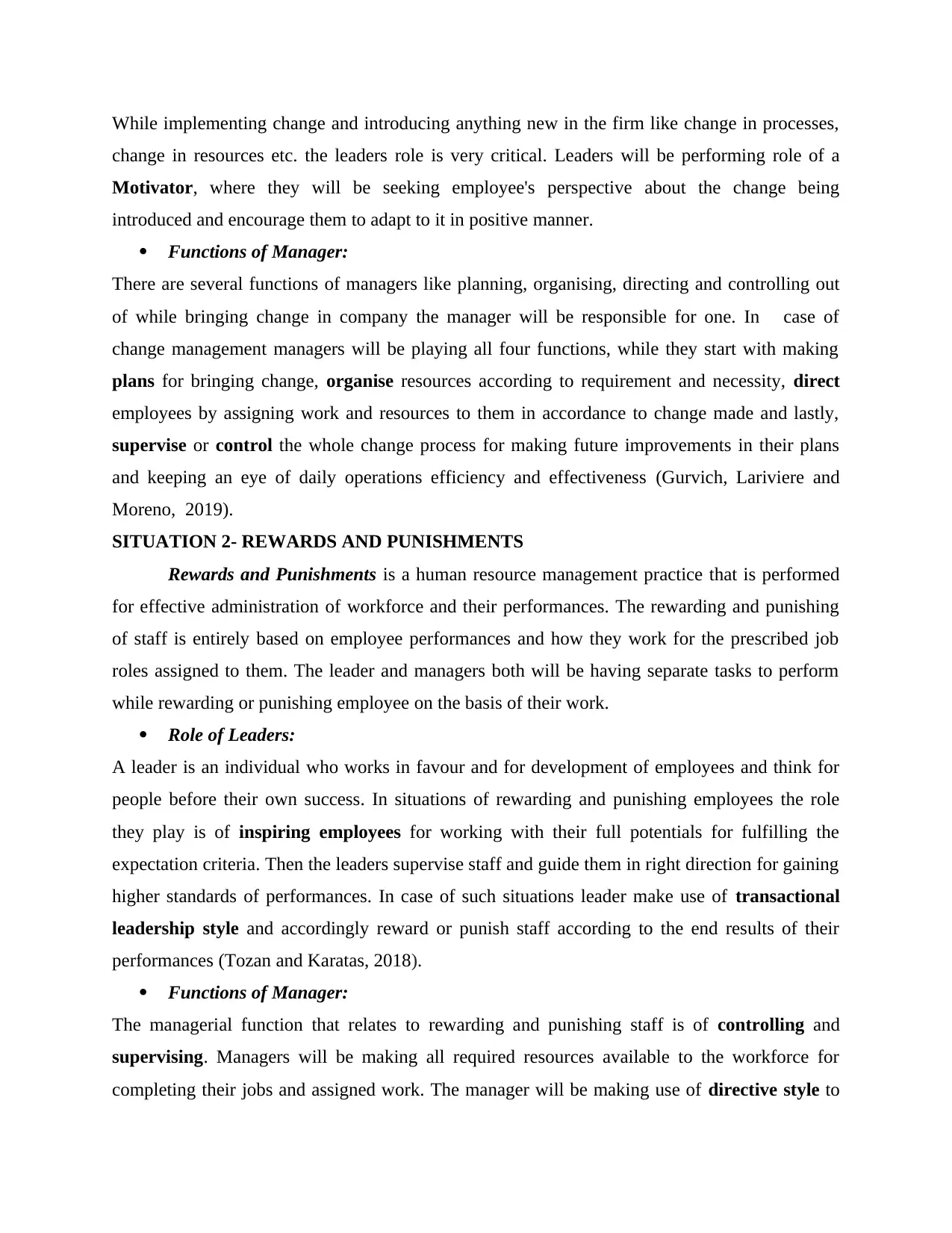
While implementing change and introducing anything new in the firm like change in processes,
change in resources etc. the leaders role is very critical. Leaders will be performing role of a
Motivator, where they will be seeking employee's perspective about the change being
introduced and encourage them to adapt to it in positive manner.
Functions of Manager:
There are several functions of managers like planning, organising, directing and controlling out
of while bringing change in company the manager will be responsible for one. In case of
change management managers will be playing all four functions, while they start with making
plans for bringing change, organise resources according to requirement and necessity, direct
employees by assigning work and resources to them in accordance to change made and lastly,
supervise or control the whole change process for making future improvements in their plans
and keeping an eye of daily operations efficiency and effectiveness (Gurvich, Lariviere and
Moreno, 2019).
SITUATION 2- REWARDS AND PUNISHMENTS
Rewards and Punishments is a human resource management practice that is performed
for effective administration of workforce and their performances. The rewarding and punishing
of staff is entirely based on employee performances and how they work for the prescribed job
roles assigned to them. The leader and managers both will be having separate tasks to perform
while rewarding or punishing employee on the basis of their work.
Role of Leaders:
A leader is an individual who works in favour and for development of employees and think for
people before their own success. In situations of rewarding and punishing employees the role
they play is of inspiring employees for working with their full potentials for fulfilling the
expectation criteria. Then the leaders supervise staff and guide them in right direction for gaining
higher standards of performances. In case of such situations leader make use of transactional
leadership style and accordingly reward or punish staff according to the end results of their
performances (Tozan and Karatas, 2018).
Functions of Manager:
The managerial function that relates to rewarding and punishing staff is of controlling and
supervising. Managers will be making all required resources available to the workforce for
completing their jobs and assigned work. The manager will be making use of directive style to
change in resources etc. the leaders role is very critical. Leaders will be performing role of a
Motivator, where they will be seeking employee's perspective about the change being
introduced and encourage them to adapt to it in positive manner.
Functions of Manager:
There are several functions of managers like planning, organising, directing and controlling out
of while bringing change in company the manager will be responsible for one. In case of
change management managers will be playing all four functions, while they start with making
plans for bringing change, organise resources according to requirement and necessity, direct
employees by assigning work and resources to them in accordance to change made and lastly,
supervise or control the whole change process for making future improvements in their plans
and keeping an eye of daily operations efficiency and effectiveness (Gurvich, Lariviere and
Moreno, 2019).
SITUATION 2- REWARDS AND PUNISHMENTS
Rewards and Punishments is a human resource management practice that is performed
for effective administration of workforce and their performances. The rewarding and punishing
of staff is entirely based on employee performances and how they work for the prescribed job
roles assigned to them. The leader and managers both will be having separate tasks to perform
while rewarding or punishing employee on the basis of their work.
Role of Leaders:
A leader is an individual who works in favour and for development of employees and think for
people before their own success. In situations of rewarding and punishing employees the role
they play is of inspiring employees for working with their full potentials for fulfilling the
expectation criteria. Then the leaders supervise staff and guide them in right direction for gaining
higher standards of performances. In case of such situations leader make use of transactional
leadership style and accordingly reward or punish staff according to the end results of their
performances (Tozan and Karatas, 2018).
Functions of Manager:
The managerial function that relates to rewarding and punishing staff is of controlling and
supervising. Managers will be making all required resources available to the workforce for
completing their jobs and assigned work. The manager will be making use of directive style to
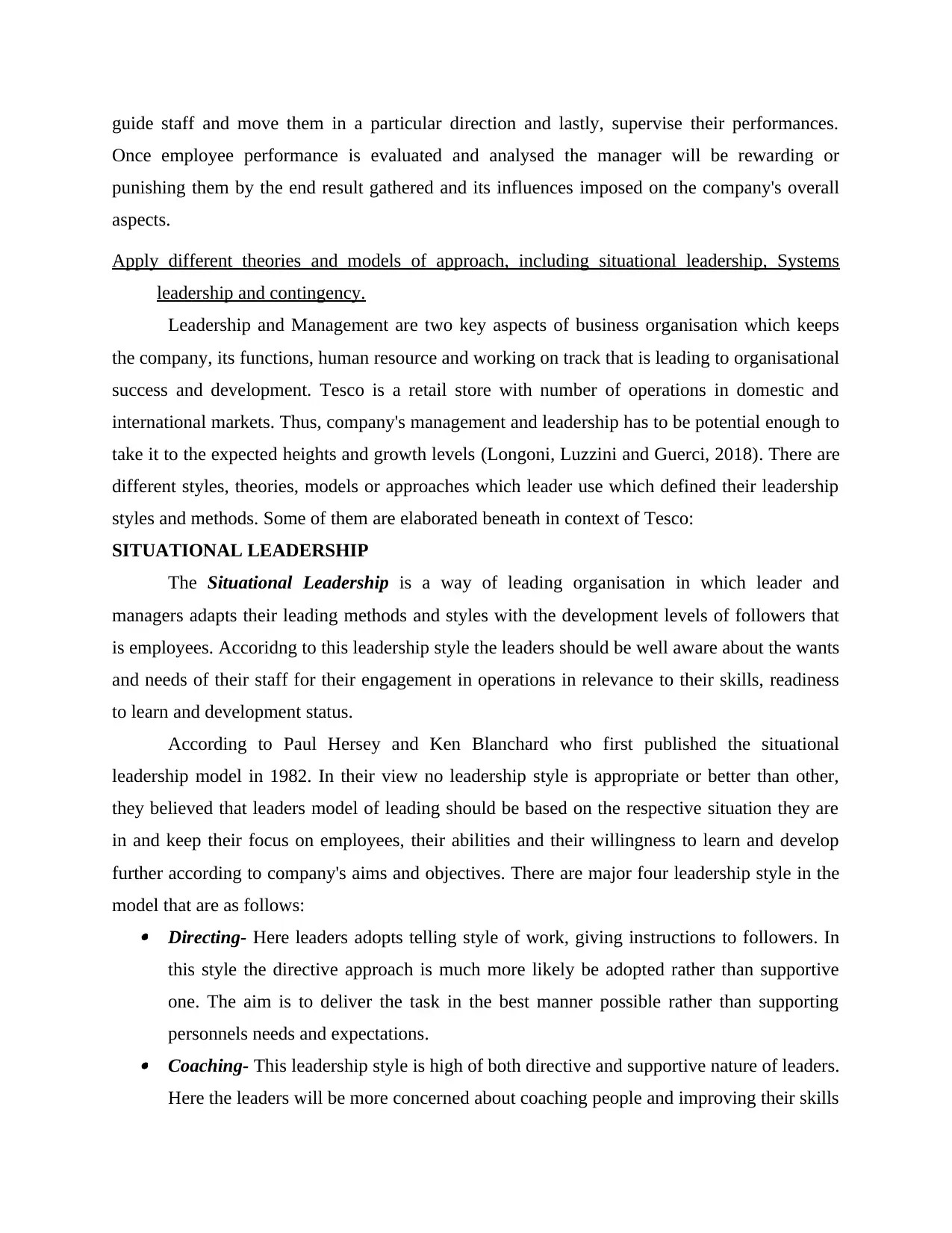
guide staff and move them in a particular direction and lastly, supervise their performances.
Once employee performance is evaluated and analysed the manager will be rewarding or
punishing them by the end result gathered and its influences imposed on the company's overall
aspects.
Apply different theories and models of approach, including situational leadership, Systems
leadership and contingency.
Leadership and Management are two key aspects of business organisation which keeps
the company, its functions, human resource and working on track that is leading to organisational
success and development. Tesco is a retail store with number of operations in domestic and
international markets. Thus, company's management and leadership has to be potential enough to
take it to the expected heights and growth levels (Longoni, Luzzini and Guerci, 2018). There are
different styles, theories, models or approaches which leader use which defined their leadership
styles and methods. Some of them are elaborated beneath in context of Tesco:
SITUATIONAL LEADERSHIP
The Situational Leadership is a way of leading organisation in which leader and
managers adapts their leading methods and styles with the development levels of followers that
is employees. Accoridng to this leadership style the leaders should be well aware about the wants
and needs of their staff for their engagement in operations in relevance to their skills, readiness
to learn and development status.
According to Paul Hersey and Ken Blanchard who first published the situational
leadership model in 1982. In their view no leadership style is appropriate or better than other,
they believed that leaders model of leading should be based on the respective situation they are
in and keep their focus on employees, their abilities and their willingness to learn and develop
further according to company's aims and objectives. There are major four leadership style in the
model that are as follows: Directing- Here leaders adopts telling style of work, giving instructions to followers. In
this style the directive approach is much more likely be adopted rather than supportive
one. The aim is to deliver the task in the best manner possible rather than supporting
personnels needs and expectations. Coaching- This leadership style is high of both directive and supportive nature of leaders.
Here the leaders will be more concerned about coaching people and improving their skills
Once employee performance is evaluated and analysed the manager will be rewarding or
punishing them by the end result gathered and its influences imposed on the company's overall
aspects.
Apply different theories and models of approach, including situational leadership, Systems
leadership and contingency.
Leadership and Management are two key aspects of business organisation which keeps
the company, its functions, human resource and working on track that is leading to organisational
success and development. Tesco is a retail store with number of operations in domestic and
international markets. Thus, company's management and leadership has to be potential enough to
take it to the expected heights and growth levels (Longoni, Luzzini and Guerci, 2018). There are
different styles, theories, models or approaches which leader use which defined their leadership
styles and methods. Some of them are elaborated beneath in context of Tesco:
SITUATIONAL LEADERSHIP
The Situational Leadership is a way of leading organisation in which leader and
managers adapts their leading methods and styles with the development levels of followers that
is employees. Accoridng to this leadership style the leaders should be well aware about the wants
and needs of their staff for their engagement in operations in relevance to their skills, readiness
to learn and development status.
According to Paul Hersey and Ken Blanchard who first published the situational
leadership model in 1982. In their view no leadership style is appropriate or better than other,
they believed that leaders model of leading should be based on the respective situation they are
in and keep their focus on employees, their abilities and their willingness to learn and develop
further according to company's aims and objectives. There are major four leadership style in the
model that are as follows: Directing- Here leaders adopts telling style of work, giving instructions to followers. In
this style the directive approach is much more likely be adopted rather than supportive
one. The aim is to deliver the task in the best manner possible rather than supporting
personnels needs and expectations. Coaching- This leadership style is high of both directive and supportive nature of leaders.
Here the leaders will be more concerned about coaching people and improving their skills
⊘ This is a preview!⊘
Do you want full access?
Subscribe today to unlock all pages.

Trusted by 1+ million students worldwide

sets for ultimately assigning them higher tasks and employees can be more responsible
for their actions.
for their actions.
Paraphrase This Document
Need a fresh take? Get an instant paraphrase of this document with our AI Paraphraser
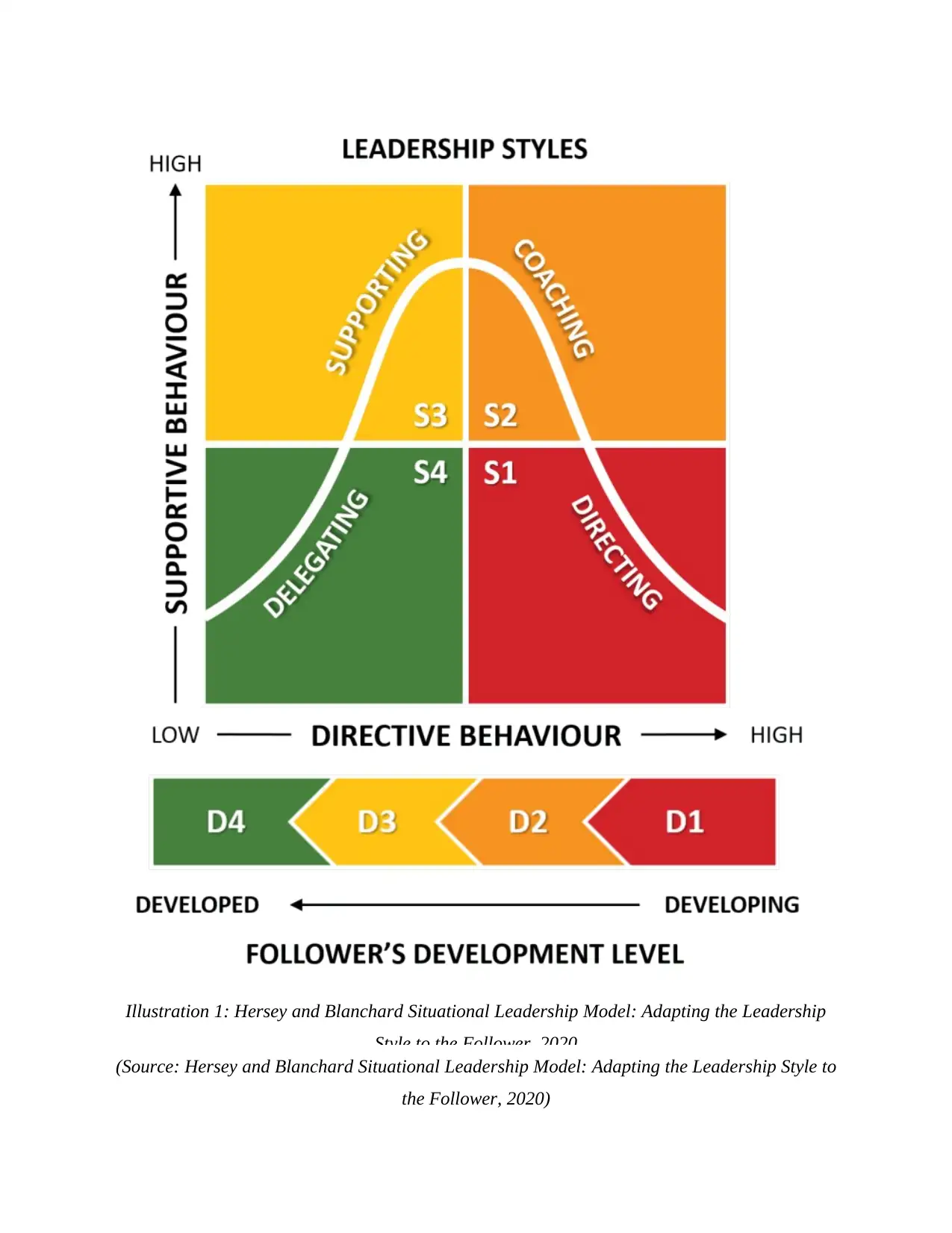
Illustration 1: Hersey and Blanchard Situational Leadership Model: Adapting the Leadership
Style to the Follower, 2020
(Source: Hersey and Blanchard Situational Leadership Model: Adapting the Leadership Style to
the Follower, 2020)
Style to the Follower, 2020
(Source: Hersey and Blanchard Situational Leadership Model: Adapting the Leadership Style to
the Follower, 2020)
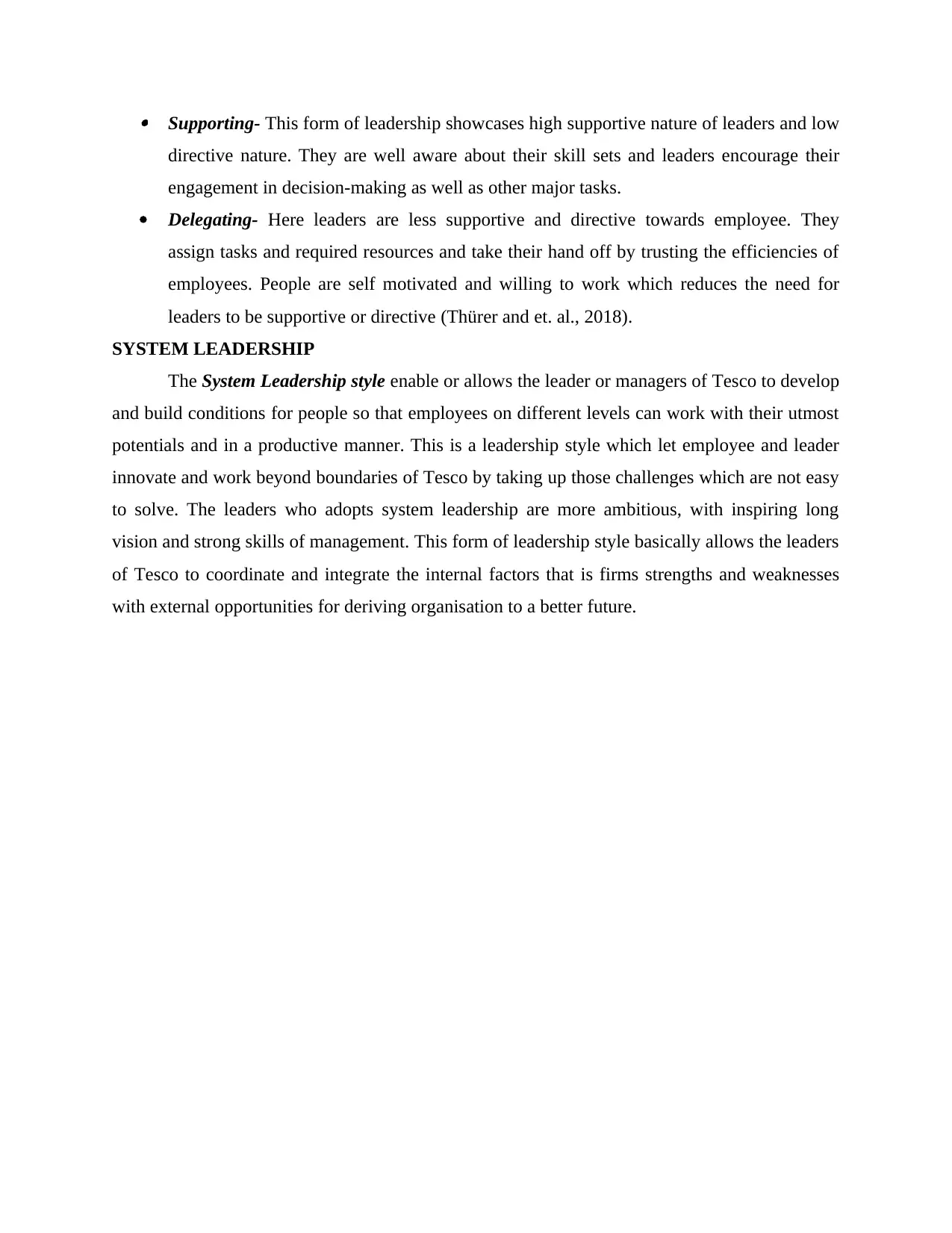
Supporting- This form of leadership showcases high supportive nature of leaders and low
directive nature. They are well aware about their skill sets and leaders encourage their
engagement in decision-making as well as other major tasks.
Delegating- Here leaders are less supportive and directive towards employee. They
assign tasks and required resources and take their hand off by trusting the efficiencies of
employees. People are self motivated and willing to work which reduces the need for
leaders to be supportive or directive (Thürer and et. al., 2018).
SYSTEM LEADERSHIP
The System Leadership style enable or allows the leader or managers of Tesco to develop
and build conditions for people so that employees on different levels can work with their utmost
potentials and in a productive manner. This is a leadership style which let employee and leader
innovate and work beyond boundaries of Tesco by taking up those challenges which are not easy
to solve. The leaders who adopts system leadership are more ambitious, with inspiring long
vision and strong skills of management. This form of leadership style basically allows the leaders
of Tesco to coordinate and integrate the internal factors that is firms strengths and weaknesses
with external opportunities for deriving organisation to a better future.
directive nature. They are well aware about their skill sets and leaders encourage their
engagement in decision-making as well as other major tasks.
Delegating- Here leaders are less supportive and directive towards employee. They
assign tasks and required resources and take their hand off by trusting the efficiencies of
employees. People are self motivated and willing to work which reduces the need for
leaders to be supportive or directive (Thürer and et. al., 2018).
SYSTEM LEADERSHIP
The System Leadership style enable or allows the leader or managers of Tesco to develop
and build conditions for people so that employees on different levels can work with their utmost
potentials and in a productive manner. This is a leadership style which let employee and leader
innovate and work beyond boundaries of Tesco by taking up those challenges which are not easy
to solve. The leaders who adopts system leadership are more ambitious, with inspiring long
vision and strong skills of management. This form of leadership style basically allows the leaders
of Tesco to coordinate and integrate the internal factors that is firms strengths and weaknesses
with external opportunities for deriving organisation to a better future.
⊘ This is a preview!⊘
Do you want full access?
Subscribe today to unlock all pages.

Trusted by 1+ million students worldwide
1 out of 23
Related Documents
Your All-in-One AI-Powered Toolkit for Academic Success.
+13062052269
info@desklib.com
Available 24*7 on WhatsApp / Email
![[object Object]](/_next/static/media/star-bottom.7253800d.svg)
Unlock your academic potential
Copyright © 2020–2026 A2Z Services. All Rights Reserved. Developed and managed by ZUCOL.



